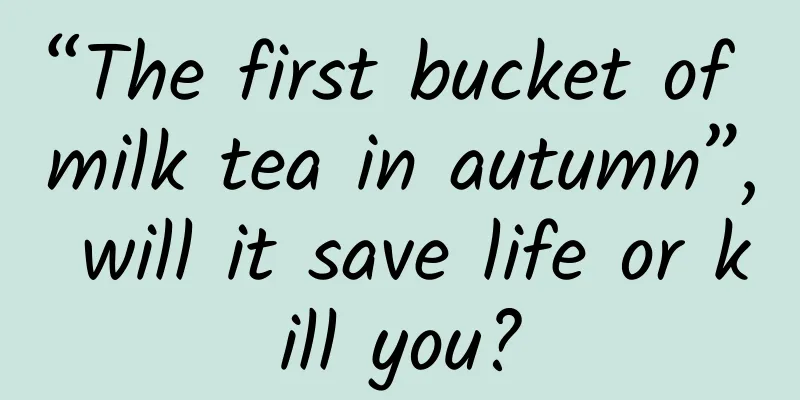“The first bucket of milk tea in autumn”, will it save life or kill you?

|
Yesterday was the beginning of autumn, and “the first cup of milk tea in autumn” once again became a hot topic. However, unlike in the past, this year, it is popular to use "buckets". "Super bucket", "king bucket", "super cup"... The capacity starts at 1 liter, and there are various fruits and ingredients in it. After finishing a bucket, you will feel very satisfied. Milk tea is the "life-saving happy water" of today's young people. It tastes really good, but you must not drink too much. News screenshots 1 cup of milk tea = 4 cups of coffee, 8 cans of Red Bull? In 2017, the Shanghai Consumers Association conducted a random inspection of milk tea, and the test results showed that 51 varieties of milk tea from 27 milk tea shops all contained a lot of caffeine! The average caffeine content per cup of all samples was 270mg, with the highest being 480mg. For a more intuitive comparison: a cup of American coffee (medium) contains only 108 mg of caffeine; a can of Red Bull contains 50 mg of caffeine. That is to say, if you drink the cup of milk tea with the highest caffeine content, it is equivalent to drinking 4 cups of coffee or 8 cans of Red Bull. This is also the reason why many people feel anxious, trembling, or even suffer from insomnia at night after drinking a cup of milk tea. In fact, it is the caffeine that is at work. Copyright image, no permission to reprint However, milk tea itself is a tea drink, so it is inevitable that it contains caffeine. So, there is no need to be afraid of caffeine. Currently, the internationally recognized caffeine intake is no more than 400 mg per day. For children, it is required not to exceed 2.5 mg/kg/day. Milk tea = milk + tea? In addition to the caffeine mentioned above, there is also a "sweet trap" in milk tea - sugar. Among the 27 cups of milk tea samples labeled with normal sweetness, the average sugar content was 34g, and the highest content in one cup was 62g, which is equivalent to 14 sugar cubes. Testing of 20 samples claiming to be sugar-free found that they all contained sugar, and the sugar content exceeded the so-called "sugar-free" standard . According to national beverage standards, drinks with sugar content below 0.5g/100g are considered sugar-free, and drinks with sugar content below 2g/100g are considered low-sugar. Coincidentally, in 2018, the Ningbo Consumer Protection Committee conducted a sweeping inspection of 1,728 beverage shops across the city. The inspection found that although sugar-free milk tea contains less sugar, the caffeine content is generally higher than that of ordinary milk tea. What’s worse is that most milk teas on the market may not contain milk. Copyright image, no permission to reprint In the spot check conducted by the Shanghai Consumers Association, it was found that the protein content in milk tea was generally insufficient, while the trans fatty acids generally exceeded the standard. This means that most of what you think is milk tea may actually be creamer. Which groups of people are not recommended to drink milk tea? As we all know, caffeine has a stimulating effect, so pregnant women, children and people with cardiovascular diseases should be careful. For people who are under a lot of stress, staying in an excited state for a long time may increase anxiety. In addition, excessive caffeine intake can lead to problems such as decreased bone density and osteoporosis . Copyright image, no permission to reprint Copyright image, no permission to reprint It is not uncommon for young people to suffer from osteoporosis, or for a 20-year-old to have the bones of a 50-year-old. In addition, the harm of high sugar is no longer a secret in the health industry. Long-term high sugar intake will cause protein loss, thus aging the skin. As for the increased risk of diabetes and cardiovascular risks, it has also been recognized by the medical community. Excessive intake of trans fatty acids will increase the risk of cardiovascular disease and induce diseases such as myocardial infarction. According to the World Health Organization, about 500,000 people die from trans fatty acids every year. In daily food, trans fatty acids are high in various butters, cakes, fried foods, etc. Trans fatty acids can also be produced when the oil temperature is too high during cooking. The amount of trans fatty acids that healthy people can metabolize in a day is 2g, and exceeding this dose is harmful to health. Therefore, "the first cup of milk tea in autumn" is not something you can drink whenever you want. Author: Zheng Yanping, Deputy Chief Physician of Geriatrics Department, Yantai Yida Hospital Review | Pa Lizhe, chief physician of nutrition, former deputy director of the Institute of Chronic Disease Prevention and Health Management of the Xinjiang Uygur Autonomous Region Center for Disease Control and Prevention The cover and text images of this article are from the copyright gallery, and the image content is not authorized for reproduction |
>>: What makes me believe in light is not Ultraman, but quantum mechanics!
Recommend
How hard is it to find a dinosaur?
Right now You are looking at this dinosaur No dou...
WeChat 8.0 released: Yellow face emojis can move and you can throw bombs to friends
[[377541]] On January 19, at the WeChat Night of ...
Are you in the right shape for hula hooping? Mathematicians prove it →
Compiled by: Gong Zixin Mechanical systems with m...
Steve Jobs was also very conflicted about whether to bring iTunes to PC
Perhaps many PC users will complain about various...
BAT and other companies are working together to eliminate traditional TV brands from the smart TV industry
An industry field that is collectively favored an...
Advanced | A promotion optimizer who spends more than 2 million per month will teach you how to place information flow ads scientifically!
With the vigorous development of mobile communica...
Mother's Day copywriting is here, here is a secret to seduce your mom!
This Sunday, May 13th is Mother's Day . In ad...
How do the Terracotta Warriors bear witness to the various aspects of life?
they Once upon a time, But "living" in ...
Explore the mystery of lunar soil during the Mid-Autumn Festival
Chairman Mao wrote in the poem "Shui Tiao Ge...
Apple released an official statement: iOS 11 titles, subtitles, and keywords should be written like this
On June 27, Apple released the public beta of iOS...
You can write programs even if you don’t know how to program - Testin AI launches new product iTestin
On October 26, 2019, the second NCTS Summit, host...
How to advance a brand? Start with these 3 systems
There is a process for consumers to come into con...
In addition to the Mausoleum of Emperor Wen of Han, are there any other major discoveries that have rewritten textbooks?
In the past two days, every time I opened my Mome...
Strategies for promoting events and attracting new customers!
This article should have been written in the firs...
Ruipu Lanjun released a series of big moves at the IAA! The Wending family products, European development strategy, and ESG carbon neutrality route were all launched
The full matrix Wending family series of products...









